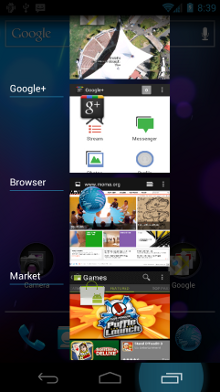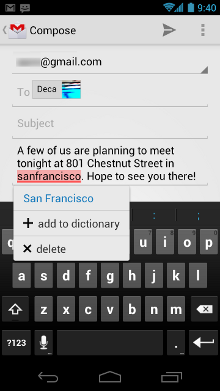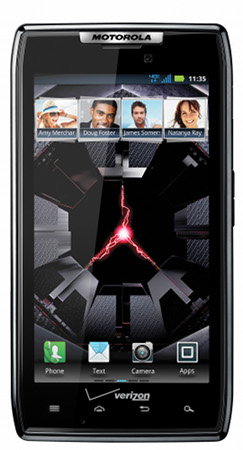Motorola ‘doesn’t even have Ice Cream Sandwich source’
Nov 7, 2011 — by LinuxDevices Staff — from the LinuxDevices Archive — 2 viewsIt will be four to six months before Android 4.0 (“Ice Cream Sandwich”) is widely available on handsets, a Motorola Mobility executive has warned. Motorola does not even have the operating system's source code yet, Ruth Hennigar, the company's vice president of software product management, reportedly added.
Google's Android 4.0 was announced Oct. 19, and will for the first time be optimized for both smartphones and tablets. It is notable for its revamped, Honeycomb-influenced user interface, according to Google: "The lock screen, widgets, notifications, multi-tasking and everything in between has been rethought and refined to make Android simple, beautiful, and beyond smart."


Android 4.0
(Click on either screen to enlarge)
Android 4.0 (above) will likely first appear on the simultaneously announced Samsung Galaxy Nexus smartphone, which will include a 4.65-inch screen, 1.2GHz processor, and NFC (near field communication) capabilities. Meanwhile, HTC announced Nov. 7 that at least seven of its phones would receive Ice Cream Sandwich upgrades in "early 2012."
 Ice Cream Sandwich (ICS) updates were also promised Oct. 21 by Motorola Mobility and Sony Ericsson. Specific mention was made of the former's Droid Bionic (pictured at left), which was briefly the company's flagship, until the Droid Razr was announced a few weeks later).
Ice Cream Sandwich (ICS) updates were also promised Oct. 21 by Motorola Mobility and Sony Ericsson. Specific mention was made of the former's Droid Bionic (pictured at left), which was briefly the company's flagship, until the Droid Razr was announced a few weeks later).
 But Ruth Hennigar (right), Motorola Mobility Vice President of Software Product Management, reportedly said Nov. 6 that "Motorola doesn't even have the [ICS] source code yet." It will take four to six months before Android 4.0 becomes widely available in handsets, she is quoted as adding in an EETimes story.
But Ruth Hennigar (right), Motorola Mobility Vice President of Software Product Management, reportedly said Nov. 6 that "Motorola doesn't even have the [ICS] source code yet." It will take four to six months before Android 4.0 becomes widely available in handsets, she is quoted as adding in an EETimes story.
Hennigar delivered a keynote titled "Android Mobility; The View from Motorola" at the AnDevCon in San Francisco (which started Nov. 6 and is due to run until Nov. 9). EETimes writer Rick Merritt was there, and characterizes Hennigar as saying that standards such as NFC (near field communication), Wi-Fi Display, Wi-Fi Direct, DLNA (digital living network alliance), and BLE (Bluetooth low-energy) hold great potential — but pose short-term pitfalls for developers.
For example, regarding NFC, she is said to have warned, "The banks, carriers and merchants all want to be in control, and customers are still nervous about using it. Right now you can only have one payment model in your phone at one time because of the carriers, and merchants don't want to deploy multiple scanning devices — so it will take a while to work out who gets the money and how."
Separately, Merritt writes, the Wi-Fi Alliance is expected to ratify by the end of the year a specification for Wi-Fi Display, a technique for streaming video from handsets to TVs. Many TV makers are expected to support the wireless link in 2012 sets but "TV manufacturers have a tendency to do their own thing, so there will be lots of interoperability challenges to make it all work," Hennigar reportedly said.
According to the EETImes story, Hennigar also sounded a note of caution about the widely touted DLNA standards for peer-to-peer media sharing among devices: "It's fairly hard to set up and discover devices on DLNA. It doesn't work consistently across devices, so if someone can crack the code on making DLNA more useable and discoverable, there should be an app for that."

Motorola Moblity's Droid Razr
(Click to enlarge)
Finally, Hennigar is reported as saying BLE (Bluetooth low-energy, part of the Bluetooth 4.0 spec) will be featured on the Droid Razr (above) when it ships Nov. 11. This technology will open the door to Bluetooth peripherals that include medical and fitness devices and a wide range of other possible products, she's said to have added.
Jonathan Angel can be reached at [email protected] and followed at www.twitter.com/gadgetsense.
This article was originally published on LinuxDevices.com and has been donated to the open source community by QuinStreet Inc. Please visit LinuxToday.com for up-to-date news and articles about Linux and open source.